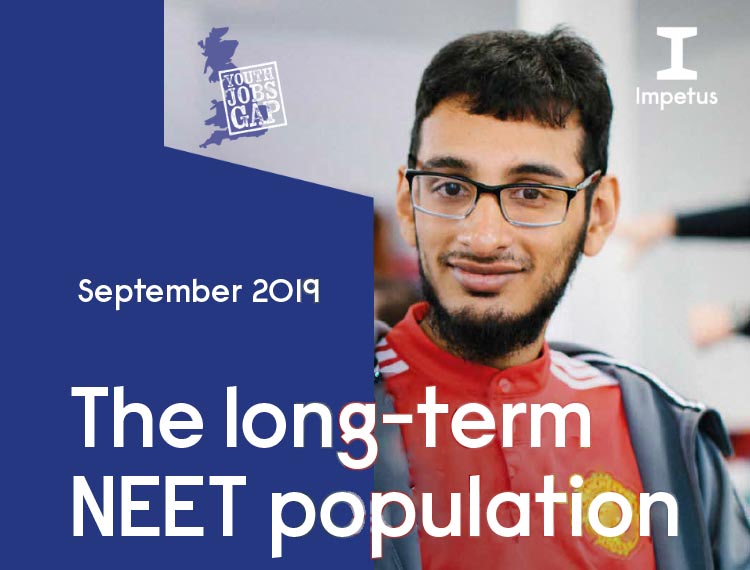The ‘NEET trap’ is locking young people out of the labour market for the long term

Most young people out of work are stuck for the long-term
A new report published today reveals for the first time the extent to which becoming NEET (Not in Employment, Education or Training) pulls young people into long-term economic inactivity. Published today by Impetus, The Long-Term NEET Population finds 75% of young people who are NEET for three months have been NEET for 12 months.
Being long-term NEET is linked to poorer health and employment outcomes decades later, creating a scarring effect. The study also reveals that young people on free school meals are twice as likely to be long-term NEET as their wealthier peers. The landmark study is the sixth report in Impetus’s Youth Jobs Gap series, which gives us the most detailed picture yet of youth unemployment, using new government data sources.
Impetus is calling for an ambitious three-pronged approach to tackle this long-term NEET issue:
- Prevent young people from becoming NEET in the first place by ensuring they get the qualifications and skills they need to succeed in the labour market.
- Do more to help young people who are NEET move quickly into education or employment to reduce the extent to which young people get stuck in the NEET trap.
- For anyone who becomes stuck for the long-term, ensure there is intensive, tailored support, especially for young people with multiple or complex needs.
The Youth Jobs Gap series uses previously unseen government data to explore the impact of growing up in a poor family on later life. Previous reports in the Youth Jobs Gap series have already established how young people on free school meals are 50% more likely to be NEET in later life than their wealthier peers, irrespective of whether they achieved the same GCSE results.
Dr. Maria Neophytou, Director of Public Affairs at Impetus said,
“Tragically, young people who are not earning or learning are not getting the support they need early on to prevent them getting stuck for the long-term. And the problem is twice as bad for those from disadvantaged backgrounds.
“Our finding that 75% of those young people who hit three months being NEET are getting stuck in a NEET trap for over a year makes for alarming reading. But our work with our charity partners shows that it doesn’t have to be this way. Prevention, early intervention and targeted intensive support provide a lifeline to young people.
“There has never been a more urgent need to help the next generation of young people as we enter a period of profound economic uncertainty. We look forward to working with governments and other partners to ensure that all young people have a more positive start to their working lives.”
Methodology
The report uses the Longitudinal Educational Outcomes (LEO) dataset to explore the impact of growing up in a poor family on later life. The LEO data connects people’s school records with their jobs record, enabling the determination of whether there is a correlation between school outcomes and employment prospects. In particular, it allows for the analysis of how disadvantaged young people –classified as those eligible for free school meals (FSM) in year 11 – fair after leaving compulsory education.
The data used in this report looks at 6 groups – or cohorts – of students who all sat their GCSEs in the same year, from 2007 to 2012. Young people are classified as NEET if they have been out of education, employment or training for at least three consecutive months up to and including March 2017.












Responses